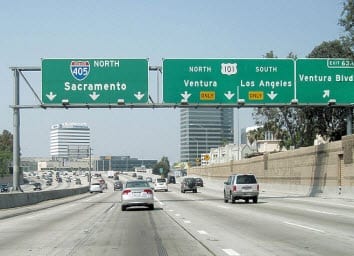California has stringent requirements when it comes to car insurance. As of 2006, drivers must provide proof of financial ability to cover the expenses related to a motor vehicle accident. Any uninsured vehicle will be impounded immediately and in addition to the expenses related to impounding the car, the driver will receive a large fine. Drivers are also financially liable for any accident in which they are involved.
Providing proof of financial ability can take one of several forms in California. Drivers can provide the state of California with a surety bond in the amount of $35,000. They may also make a cash deposit with the state of $35,000. Because these options are not usually feasible or practical for people, most prefer to utilize a motor vehicle liability insurance policy.
With that in mind, the liability insurance the state requires for legal purposes will provide drivers with a minimum of protection, but does not cover Comprehensive and Collision. Comprehensive will cover any vehicle damage considered an “act of God”, such as storm or flood damage, fire and the result of other natural disasters. Collision covers damage incurred as a result of striking another vehicle or a stationary object, such as a tree or lamppost. While drivers may want to add Collision and Comprehensive to their existing liability plans, Comprehensive and Collision alone will not satisfy the California insurance requirements and must be in addition to established liability insurance.
California minimum financial liability requirements are 15/30/5, or:
. $15,000 for injury/death to one person
. $30,000 for injury/death to multiple people
. $5,000 for property damage
In an effort to keep uninsured motorists off the road, California`s Department of Motor Vehicles, Highway Patrol and court systems are all electronically linked to all insurance companies. The moment a driver`s insurance lapses, the registration on the car is suspended automatically. Police also conduct routine checks of registration on cars during parking or moving violations. If a vehicle`s registration has been suspended due to lack of insurance, the car will also be immediately impounded.
Insurance may be obtained from any one of numerous national or independent  local providers. Drivers unable to meet their financial responsibilities may be eligible for the California Low Cost Automobile Insurance Program. Operating under the premise that the primary reason for uninsured drivers was their inability to afford car insurance, the state proposed a low-cost alternative, in the hope that more low-income drivers would purchase the insurance, lowering the number of uninsured motorists on the road. To qualify, drivers must demonstrate both financial need and a clean driving record.
local providers. Drivers unable to meet their financial responsibilities may be eligible for the California Low Cost Automobile Insurance Program. Operating under the premise that the primary reason for uninsured drivers was their inability to afford car insurance, the state proposed a low-cost alternative, in the hope that more low-income drivers would purchase the insurance, lowering the number of uninsured motorists on the road. To qualify, drivers must demonstrate both financial need and a clean driving record.
California requirements need only cover damages to another vehicle if the driver is found at fault, but not cover damages to their own car. If the car is new or still under loan, Comprehensive and Collision may be required.
Don`t forget that one of the most important considerations in determining your insurance premium is the type of vehicle you choose so its important to look at used car reviews before making any purchase.

